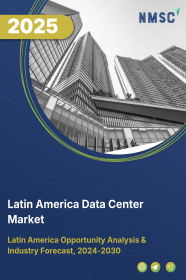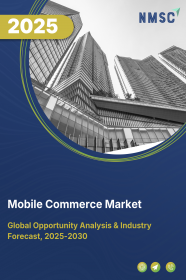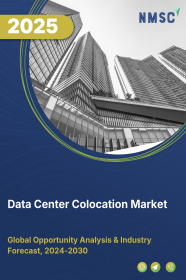
Latin America Data Center Market by Component(Hardware, Software, Services), by Type(Colocation, Hyperscale, Edge, Other Types), by Deployment Model(On-Premises, Cloud, Hybrid), by Tier Standard(Tier 1, Tier 2, Tier 3, Tier 4), by Cooling Techniques(Air Cooling, Liquid Cooling, Dry Cooling, Immersion Cooling, Others), by Enterprise Size(Large Enterprises, Small and Medium Enterprises), by End User(BFSI, IT and Telecom, Government, Energy)–Opportunity Analysis and Industry Forecast, 2024–2030
Industry: ICT & Media | Publish Date: 02-Apr-2025 | No of Pages: 173 | No. of Tables: 134 | No. of Figures: 79 | Format: PDF | Report Code : IC2446
Latin America Data Center Market Overview
The Latin America Data Center Market size was valued at USD 3.28 billion in 2023, and is predicted to reach USD 6.42 billion by 2030, at a CAGR of 10.1% from 2024 to 2030. The data center market, also known as the network infrastructure market, covers the entire lifecycle of specialized infrastructure for hosting computing systems, from initial planning and construction to ongoing operation and maintenance. This market includes a variety of components such as servers, storage systems, and networking equipment, that together provide services such as cloud computing and connectivity solutions.
Currently, the industry is experiencing widespread adoption of cloud services and the rise of edge computing aimed at reducing latency. Key trends shaping the market include a strong emphasis on sustainability, increased cybersecurity concerns, the integration of hybrid and multi-cloud approaches, and the growing influence of 5G networks. These trends highlight the industry's proactive efforts to meet the rising demand for scalable, efficient, and secure data processing and storage solutions amid the ongoing digital transformation. According to projections by the United States International Trade Commission, the data processing and storage market is expected to grow from USD 56 billion in 2020 to USD 90 billion by 2025.
Rapid development and Investment in Network Infrastructure Boosts the Growth of the Market
Within Latin America, countries such as Brazil, Chile, and Colombia stand out in the data center industry. According to CloudScene's data, Brazil leads with 163 infrastructure centers, followed by Chile with 50 and Colombia with 36.
This regional prominence underscores the growing significance of Latin America in the global market landscape. These countries are witnessing rapid development and investment in network infrastructure, positioning themselves as key players in the digital economy.
Strategic Investments and Technological Advancements Accelerates the Latin America Data Center Market Growth
In January 2024, Brazilian tech firm Soluti inaugurated a new 4,500 sqm Tier III data center, the Cassio Vieira de Sousa Building, in Goiânia, its headquarters. LEED Gold certified, the facility not only enhances Soluti's capabilities but also bolsters the market in Brazil's Midwest Region, catering to the increasing demand for reliable and secure data storage and processing solutions.
Additionally, Oracle's investment of over USD 100 million in its second Chilean network infrastructure "Oracle Cloud Valparaiso Region," represents a significant milestone in the region's technological advancement. The site's connection to the Humboldt submarine cable further strengthens Oracle's position as a leading cloud service provider in Latin America, fostering connectivity and supporting Chile's technological development. These strategic investments underscore the region's growing potential and its role in driving innovation and digital transformation on a global scale.
High Initial Investment Hinders the Latin America Data Center Market Growth
The data center market faces significant hurdles, primarily due to the substantial initial investment required and stringent environmental regulations. Establishing and maintaining network infrastructure demands considerable upfront financial commitments, creating barriers for smaller enterprises and start-ups attempting to enter the market. Additionally, ongoing compliance with environmental standards necessitates continuous investment in energy-efficient technologies hinders the overall Latin America data center market growth.
Integration of Edge Computing Presents Lucrative Opportunity for Market Expansion
The integration of edge computing operations presents promising prospects for the Latin America data center market expansion. By minimizing latency and enabling real-time processing, edge computing supports applications such as the Internet of Things (IoT) and Augmented Reality (AR), reducing the load on centralized cloud data center market while providing scalability and flexibility.
This decentralized approach not only enhances security by processing sensitive data locally but also aligns with evolving digital landscapes, creating diverse opportunities for network infrastructure providers. Recent investments in startups such as Armada indicate the growing interest in edge computing solutions, signaling a concerted effort to address connectivity challenges and bridge the digital divide.
Competitive Landscape
The key market players operating in the Latin America data center industry includeAscenty, Scala Data Centers, Lumen Technologies Inc., SONDA SA, Terremark, EdgeUno Inc., Equinix Inc., HostDime Global Corp., ODATA (Patria Investments Ltd), Data Horizon Americas, HostDime, Elea Digital, KIO Networks, EdgeUno, Cirion Technologies and others.
Latin America Data Center Market Key Segments
By Component
-
Hardware
-
UPS
-
Generators
-
Transfer Switches
-
Cooling Systems
-
Computer Room Air Conditioning (CRAC)
-
Racks
-
Others
-
-
Software
-
Services
By Type
-
Colocation
-
Hyperscale
-
Edge
-
Other Types
By Deployment Model
-
On-Premises
-
Cloud
-
Hybrid
By Tier Standard
-
Tier 1
-
Tier 2
-
Tier 3
-
Tier 4
By Energy Requirement and Power Density
-
Low Power (Less than 20MW)
-
Medium Power (20-100MW)
-
High Power (100MW and More)
By Cooling Techniques
-
Air Cooling
-
Liquid Cooling
-
Dry Cooling
-
Immersion Cooling
-
Others
By Enterprise Size
-
Large Enterprises
-
Small and Medium Enterprises
By End User
-
BFSI
-
IT and Telecom
-
Government
-
Energy and Utilities
-
Other End Users
KEY PLAYERS
-
Ascenty
-
Scala Data Centers
-
Lumen Technologies Inc.
-
SONDA SA
-
Terremark
-
EdgeUno Inc.
-
Equinix Inc.
-
HostDime Global Corp.
-
ODATA (Patria Investments Ltd)
-
Data Horizon Americas
-
HostDime
-
Elea Digital
-
KIO Networks
-
EdgeUno
-
Cirion Technologies
REPORT SCOPE AND SEGMENTATION:
|
Parameters |
Details |
|
Market Size in 2023 |
USD 3.28 Billion |
|
Revenue Forecast in 2030 |
USD 6.42 Billion |
|
Growth Rate |
CAGR of 10.1% from 2024 to 2030 |
|
Analysis Period |
2023–2030 |
|
Base Year Considered |
2023 |
|
Forecast Period |
2024–2030 |
|
Market Size Estimation |
Billion (USD) |
|
Growth Factors |
|
|
Companies Profiled |
15 |
|
Market Share |
Available for 10 companies |
|
Customization Scope |
Free customization (equivalent up to 80 working hours of analysts) after purchase. Addition or alteration to country, regional, and segment scope. |
|
Pricing and Purchase Options |
Avail customized purchase options to meet your exact research needs. |

















 Speak to Our Analyst
Speak to Our Analyst





















